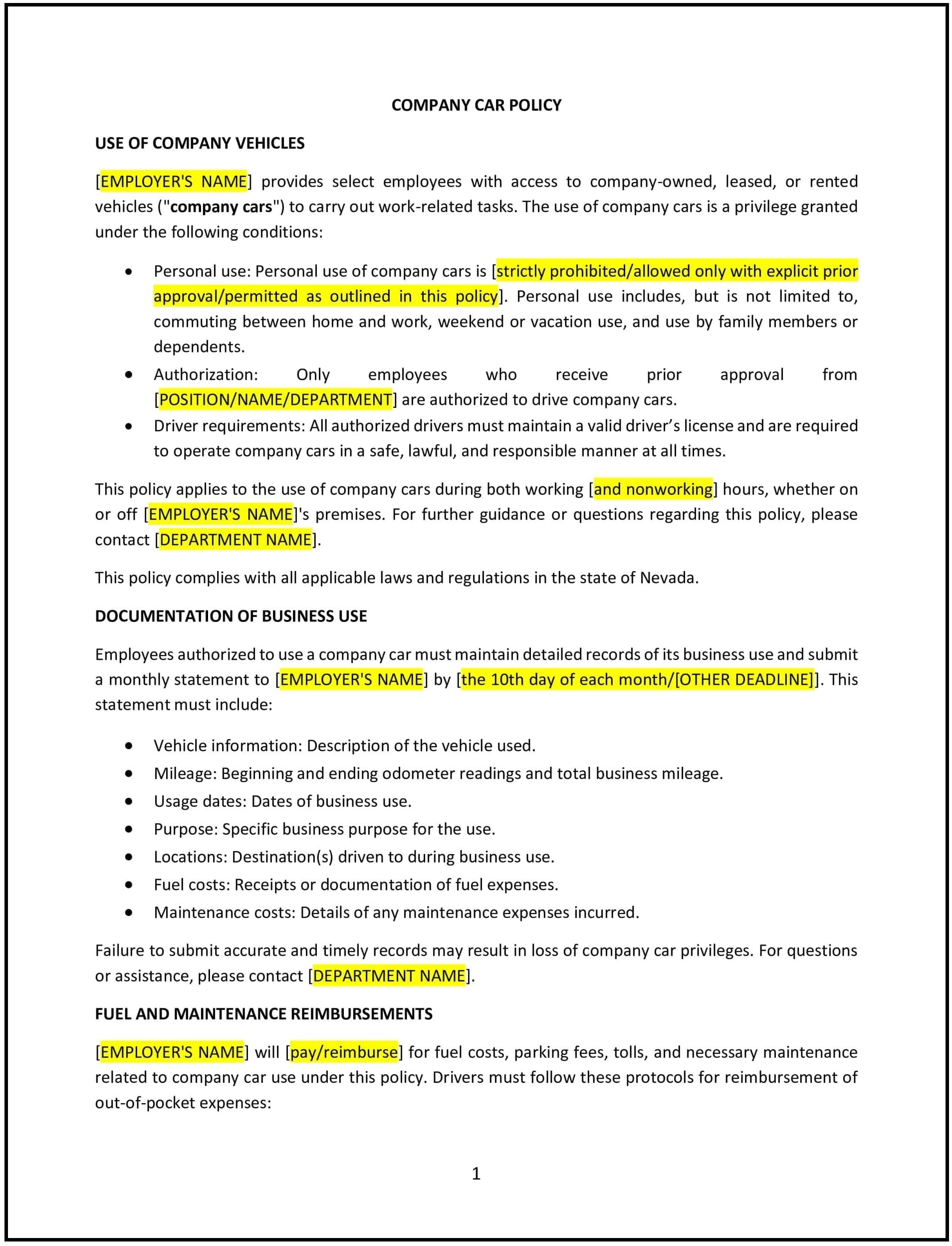Got contracts to review? While you're here for policies, let Cobrief make contract review effortless—start your free review now.

Customize this template for free
Company car policy (Nevada)
This company car policy is designed to help Nevada businesses provide guidelines for the use of company-owned vehicles. It outlines the responsibilities of employees who are authorized to use company cars for work-related purposes, ensuring safe and responsible use while protecting the company’s assets.
By adopting this policy, businesses can set clear expectations regarding the use of company cars, reduce liability, and promote safe driving practices among employees.
How to use this company car policy (Nevada)
- Define eligibility: Specify which employees are eligible to use company cars, based on job responsibilities or seniority. Include any conditions such as the requirement for employees to have a valid driver’s license and a clean driving record.
- Set guidelines for vehicle use: Clearly outline the approved uses of company cars, such as driving to meetings, job sites, or other work-related activities. Include restrictions on personal use and the limits on driving outside of business hours or geographic areas.
- Establish maintenance responsibilities: Specify who is responsible for maintaining the vehicle, including regular servicing, cleaning, and fueling. Clarify whether employees should report any vehicle issues or accidents promptly.
- Address insurance and liability: Ensure that employees understand the company’s insurance coverage for company cars, including liability coverage, and any responsibilities employees have if they are involved in an accident while using the vehicle.
- Outline safety and behavior expectations: Establish rules for safe driving, such as obeying traffic laws, avoiding distractions, and using seat belts. Set clear expectations for behavior, including prohibiting the use of the vehicle under the influence of alcohol or drugs.
- Clarify costs: Outline the financial aspects of company car use, such as whether the company covers fuel, tolls, parking, and maintenance costs, or whether employees are expected to reimburse the company for certain expenses.
- Set guidelines for vehicle return: Specify the procedure for returning the company car, whether upon termination of employment or at the end of the assignment or project. Include the process for returning the vehicle in good condition.
Benefits of using this company car policy (Nevada)
This policy provides several key benefits for Nevada businesses:
- Reduces liability: Clear guidelines and insurance coverage help protect the company from potential legal issues related to the use of company cars.
- Ensures safety: Establishes expectations for safe driving and responsible vehicle use, reducing the risk of accidents or unsafe driving behavior.
- Promotes consistency: Ensures that all employees using company cars follow the same rules and procedures, promoting fairness and consistency across the organization.
- Protects company assets: By setting clear maintenance and usage guidelines, the policy helps maintain the condition and longevity of company vehicles.
- Improves cost management: Clear guidelines for expenses help businesses track and control costs associated with fuel, maintenance, and vehicle usage.
Tips for using this company car policy (Nevada)
- Communicate the policy effectively: Ensure that all employees eligible to use company cars understand the policy, including any expectations around usage, maintenance, and safety.
- Regularly review the policy: Periodically review and update the policy to reflect changes in company practices, insurance coverage, or state and federal regulations.
- Provide regular vehicle inspections: Schedule regular inspections and maintenance of company cars to ensure they remain in safe working order.
- Monitor expenses: Track costs associated with company cars, including fuel, maintenance, and any incidental charges, to ensure that they align with company expectations.
- Encourage accountability: Remind employees that they are responsible for the vehicle while it is in their possession and that any misuse or violation of the policy may lead to disciplinary action.